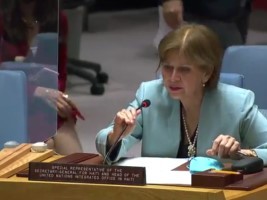|
||||||||||||||||||
| Download the revised decree and electoral calendar, published in the official journal |
|
|
Haiti - Insecurity : Situation in Haiti, UN report 18/06/2021 11:23:51
Thursday, June 17, 2021 in the afternoon, the periodic report (every 120 days) of the United Nations Integrated Office in Haiti (BINUH), on the situation in Haiti, was presented to the United Nations Security Council at New York. "[...] The report says about the security situation has been marked by significantly increased levels of kidnappings, with 171 abductions reported in the first four months of 2021, affecting all spheres of society and creating a pervasive sense of anxiety. Limited results by the authorities in curbing crime, including a failed police operation in March in Village de Dieu, a waterfront shanty town in the Port -au-Prince metropolitan area, dealt a further blow to the nation’s confidence in the State’s capacity to ensure public safety. Perceptions of deteriorating security grew more acute as State measures to tackle crime and armed gang violence remained largely unsuccessful. The inability to restore and maintain order throughout the Port-au-Prince metropolitan area was highlighted by several key incidents, including a major prison break in Croix-des-Bouquets on 25 February, a failed police operation in Village de Dieu on 12 March and gang attacks in Bel-Air on 31 March and 1 April. The sense of insecurity was also exacerbated by spikes in several security indicators. There was a 36 per cent increase in the number of kidnappings in the first four months of 2021, with 171 abductions reported, compared with 110 in the last four months of 2020. That alarming trend, including the abduction of a group of some 10 individuals, including 7 Haitian and French clergy members, on 11 April, stoked public frustration and galvanized the Catholic Church, along with the education and privatesectors, to lead national shutdowns in protest. The number of intentional homicides increased by 17 per cent, with 525 cases reported from January to April, compared with 436 in the last four months of 2020. Of note, police officers were increasingly targeted by gangs in reprisals, resulting in 18 officers being killed and 35 wounded. The Haitian National Police registered an uptick in armed robberies by common criminals riding motorbikes, in addition to armed gangs targeting bank customers and local entrepreneurs. The number of incidents of civil unrest increased by 30 per cent compared with the previous four months, with 486 episodes recorded from January to April, of which 410 were not peaceful. The number of instances of gender-based violence reported by the national health system increased by 19 per cent between January and April, while the police registered a 44 per cent decline in the number of rapes reported, from 56 to 39 cases. The Superior Council of the National Police progressively adopted measures to respond to escalating public safety concerns. They included tightened controls over bank transactions to freeze financial assets of criminal groups, strengthened joint police/customs inspections at major seaports and increased oversight of private security companies to stem trafficking in arms. To deter kidnappings, the former Prime Minister, Mr. Jouthe, as head of the Superior Council, banned the use of tinted windows on all vehicles not bearing official or diplomatic license plates, while the national police Director General ad interim established an anti-kidnapping task force and a hotline to report incidents. The measures were widely criticized as ad hoc reactions rather than part of a comprehensive public safety plan. Against that backdrop, the President requested additional assistance from the United Nations to take on the mounting crime and violence, which are exacerbating a dire socioeconomic situation. In response, senior United Nations police advisers were deployed in May to provide additional expertise in strengthening police intelligence and investigation capacity in anti-gang and violence reduction strategies. Against that backdrop, the President requested additional assistance from the United Nations to take on the mounting crime and violence, which are exacerbating a dire socioeconomic situation. In response, senior United Nations police advisers were deployed in May to provide additional expertise in strengthening police intelligence and investigation capacity in anti-gang and violence reduction strategies. The then Prime Minister convened in early April the first interministerial task force on the draft national strategy for community violence reduction, giving it a mandate to finalize the strategy and develop an immediate and integrated response to gang violence based on national priorities with, if necessary, a realignment of existing project priorities. The task force is to report back to the Office of the Prime Minister by the end of June. Meanwhile, women’s community -based organizations in gangaffected neighbourhoods were consulted on the draft strategy by the National Commission for Disarmament, Demobilization and Reintegration, with a view to informing the work of the task force and reinforcing women’s roles in peacebuilding by ensuring that women are included in community violence reduction programmes from the beginning, starting with the identification of community leaders, participants and beneficiaries of programmes. In parallel, a task force led by the Ministry of Justice and Public Security completed its review of the draft law on firearms and ammunition, as part of a Peacebuilding Fund project on weapons and ammunition management implemented by UNDP with support from BINUH and the United Nations Regional Centre for Peace, Disarmament and Development in Latin America and the Caribbean. The Government also requested the United Nations Insti tute for Disarmament Research to lead a weapons and ammunition management baseline assessment to inform the drafting of a national action plan in line with the Roadmap for Implementing the Caribbean Priority Actions on the Illicit Proliferation of Firearms and Ammunition across the Caribbean in a Sustainable Manner by 2030, developed by the Caribbean Community. Preparations continued for the implementation of the Peacebuilding Fund community violence reduction project to map community platforms and bett er support long-term socioeconomic development efforts in gang -affected areas. UNOPS, UNDP, BINUH and the United Nations Population Fund held coordination meetings with implementing partners, community representatives and State institutions to articulate a common strategic vision for intervention in the fragile Port-au-Prince neighbourhoods of Martissant and La Saline. Lastly, the Peacebuilding Fund approved a new project to prevent violence, manage conflicts, strengthen dialogue and combat gender -based violence in 2021. It has a budget of $1.5 million and is to be implemented by UNDP and UN -Women, in close partnership with BINUH. In line with Security Council resolution 1325 (2000), the Spotlight Initiative also partnered with the Women’s Peace and Humanitarian Fund to channel institutional and programmatic funding in the amount of $1.2 million to civil society organizations working to prevent and respond to violence against women and girls." Download the full statement by Helen La Lime, Special Representative of the Secretary General of the United Nations in Haiti, to the Security Council (PDF) : https://www.haitilibre.com/docs/la-lime-17-06-2021-en.pdf HL/ HaïtiLibre
|
|
|
Why HaitiLibre ? |
Contact us |
Français
Copyright © 2010 - 2026 Haitilibre.com |





